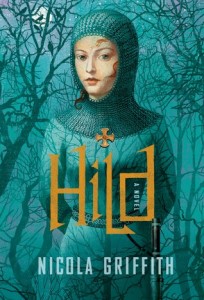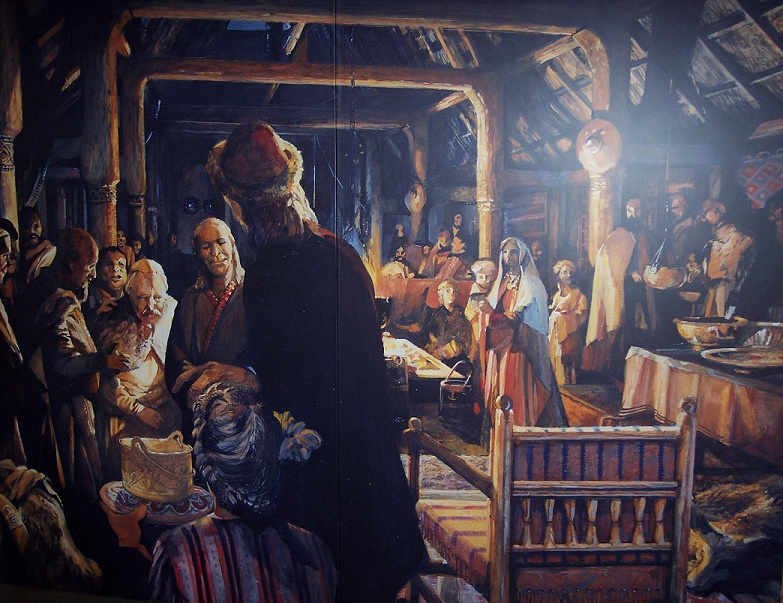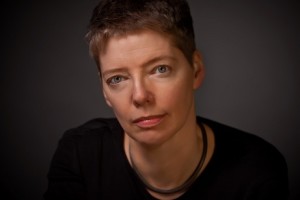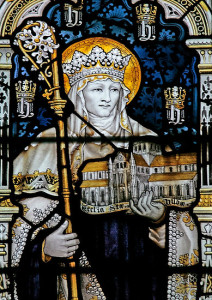Andrew and I recently finished Nicola Griffith’s Hild. We shared are thoughts on the book in an email conversation.

Chris: Fiction about the Middle Ages can be a very mixed bag of idealized medievalisms and anachronistic pageantry. Knights gallivant across countrysides regardless of a historical tradition of chivalry in that country, dressed in armor shining bright despite the technology or preferred protection of the time. Honor and such are paramount. I love the Middle Ages, but reading historical fiction set in the time period can be a considerable chore given how many authors opt to write what feels medieval instead of what is medieval. Such is gloriously not the case with Hild.
Hild is a master class in narrative description and world-building. Griffith spent years researching life in 7th-century England and it shows from page one, immersing readers in such a wealth of detail that the rhythms and assumptions of a time 1,400 years ago become if not natural then at least understandable. Even languages are grounded in the concrete, being compared to apples and swiftly flowing rivers. The rich precision of each description illuminates a period known colloquially for its darkness, revealing the humanity found within.
The metaphors and the symbolism of the later chapters build off this description, creating a narrative system that rests entirely on its own medieval legs. That is the highest praise I can give a historical novel: the book turns a period alien and remote from our own into something familiar on its own terms, lending a deeper humanity to its characters because each decision they make makes perfect medieval sense.
Andrew: As a pure and simple narrative, Hild excels just as much, but in a different way than modern readers are used to. Instead of a cinematic, action-filled plot that moves naturally from point A to Z hitting every logical step in between (although there is plenty of action, including some of the most vividly rendered battle sequences one could ask for), Griffith writes with a style that represents the outlandish love child of Henry James and the writer of Beowulf.
In the Jamesian sense, the book unfolds in distinct scenes full of impressions and subtext, separated from each other by gaps of missing time which force the reader to infer what happened. This works in Griffith’s favor: concentrating on moments and minutiae results in flowing prose as lyrical as the lines spun by the bards she features in her story, every phrase connecting with the others to create meaning. And in the aspects shared with Beowulf, and I would add, the epics of Homer and Virgil, Griffith mixes that magnificent descriptive sense with a double-layered attitude of awe, legend, and wonder of the mystical and spiritual.
Hild’s adventures and achievements are plausible, but the reader stands in awe as said exploits pile up because we also see her as a normal young woman full of recognizable hopes, fears, emotions, and flaws which detract nothing from her prowess. And Hild herself, and the other characters, see the world through the lens of people both grounded in the coarse realities of medieval times and hungry for the promise of something more and greater, who have spent their existence in touch with gods of all sorts and who find omens and signs in anything. (I do not know what Griffith’s own religious background is, but as a Christian myself, the scene of Hild’s baptism was so emotionally correct I trembled reading it.)
Chris: I really liked her treatment of religion, too. And this from not-a-Christian. Griffith makes the wise choice of divorcing the political intrigue from the spirituality of the world. Both pagan and Christian priests engage in cutthroat machinations, the former to hang onto power, the latter to snatch it away. But these don’t stand for the larger religions. Hild and others are allowed to feel whatever feels true to their characters while the political maneuvering stays the obsession of the ambitious. That step back from the story that Griffith herself takes—allowing the characters to step forward—is just one of many artistically mature choices she makes, allowing her to dig deeper into the characters, rooting out the humanity in them and their situations.
Andrew: Regarding how the characters come alive, and moving away from the religious aspect (which we had to discuss since Hild is indeed a saint), Hild has one other thing in common with Beowulf, Homer, and Virgil: a protagonist who walks a complex line between proactivity and being at the whim of higher powers. In some ways, Hild denies Kurt Vonnegut’s edict to “make your characters want something right away even if it’s only a glass of water.” She begins the book not seeming to want much of anything, with no plans of her own. Instead, she reacts to others, possibly too much, carrying out the agenda of her widowed, noble mother Breguswith, whose mixture of ambition and maternal instinct is a remarkably complex one, and always ready to concur with the wishes of King Edwin. This position makes a certain amount of inevitable sense, because Hild’s status as both a child (in the beginning) and as Edwin’s seer, a figure no one wishes to get close to, puts her in background with less of a chance for agency.
But like Odysseus, Aeneas, and the king of the Geats, Hild’s respect for those above her, temporal and spiritual, cannot ultimately stop her from action, decision, and will. It is she, not her mother, who frames her prophecies to appeal to Edwin and eventually his bishop, the devout but impractical Paulinus. She will charge into battle when needed. She organizes a household. She is a loyal friend who arranges, or tries to arrange, for those she cares about, from fellow nobles to her teachers and slaves, to get what they want. And in a very profound sense, as someone conscious of her wyrd (fate), Hild almost unconsciously decides early on where her particular wyrd lies, and when one looks back at the novel after it reaches a surprising but highly satisfying conclusion, she has taken so many steps, and moved against the wills and wishes of others, to achieve said conclusion that it seems to have been her most impossible of feats.
And one other thing about Hild’s agency: she’s sexually active. Bisexually active. And very much in control. She spends most of the novel meditating on two passions: the bond of friendship slowly turning, on her side, to love, for her childhood playmate and now bold, brilliant sparring partner Cian, and the physical, romantic satisfaction she finds with her female slave and ultimately freed chief servant, Glwadus (pronounced “oo-la-doose”). This depiction of Hild’s personal life, both the emotional and matter-of-fact approaches she has to it and the unquestioning acceptance of it by her society, is one of the finest parts of Griffith’s book. She makes Hild’s sexuality special by not glorifying it but instead stating “this is what it is” and clarifying that this was the general tenor of her circle. It’s a tone more writers should strive to emulate.
Chris: That acceptance by Hild’s intimate female circle becomes a keystone of the novel. For a book about a Christian saint in pre-Norman England, Hild unabashedly puts women at the forefront. It passes the Bechdel test on page two and never stops acing it. When was the last time you read a novel in which a king bemoans not having a daughter? This might sound weird to most, but that would be based on bad cliches and misconceptions about women’s place in early medieval Anglo-Saxon society. One of the most emotionally thrilling scenes in the book is when the king tasks a young Hild with bearing his mead cup around the great hall—a task that will secure her place in his court if she succeeds without spilling a drop. This was a task that only women could perform, and it was a crucial part of strengthening political alliances (depending on who was served first, etc.).

Griffith doesn’t hide other, more mundane jobs that women performed (spinning yarn, sewing sails, churning butter, baking bread), but she enriches them by reminding us of the life that’s there: the ambitions, the desires, the motives of the women at work. Men and women in Hild—more so than in any other medieval novel I’ve read — are woven together in a rich and complicated tapestry, otherwise called society. Even churning butter can lead to revelation.
I must admit that I was frustrated by the main character in the middle of the novel for her denial of what I refer to as Vonnegut’s Law. I would have killed to have any inkling of what it was she wanted. And my one criticism of the book is that the plot dies there (I complained to our own Alex Bean that the novel had become a “Dark Age New Yorker piece”). But to read for the plot is to misread the book, and I was at home enough in the world, the time, and the landscape to follow it as it meandered for a good long while, Hild herself even remarking on her life’s general lack of direction.
Griffith has compared her book to A Song of Ice and Fire, but the one that kept coming to mind for me was Hilary Mantel’s Wolf Hall. As in Hild, Wolf Hall is focused on one character, Thomas Cromwell, and his ups and downs as he navigates the dicey waters that surround a king, Henry VIII. As in Hild, the narrative is thick with atmosphere, the plot more skeletal, more implied than experienced. Unlike Hild, the central narrative of Wolf Hall—the rise of Anne Boleyn—is well-known and can be taken for granted by the author and reader. There is an inevitability in the events even as they are lightly sketched around the character-mining that is the book’s true aim. Conversely, I had never heard of King Edwin of Northumbria, so I had a harder time staying with the ins-and-outs and all the names and Hild’s disappointing lack of ambition, before a final crisis galvanized the narrative in its last hundred pages. Obviously, I stuck with it, and I was glad I did.
Andrew: It is a novel that for all its minor difficulties (I kept the glossary and maps perpetually bookmarked and had to look back several times to remind myself who a character was in relation to the grand scheme of things … but no more than your average reader of Martin) flows so easily for those who invest their time and emotional energy in it. We read history in search of meaning for our life, trying to discern the future from the patterns of the past, and such a search is made more fruitful when we do not glimpse the past as something far gone but sense it again as a living, textured, dynamic moment. Griffith does not try to modernize a thing about her England: the speech patterns and much of the cultural tapestry have little to no relationship to our modern reality. But the power dynamics, the motivations, the emotions … all of these are impossible to not relate to and, especially the magisterial female presence, envision emulating.
Hild succeeds as a work of literary art that deserves reading, reflection, and the wonderful pleasure of feeling Hild swinging her weaponry, drinking her beer, experiencing her pleasures and euphorias, living her life … a life that reminds us that even if we don’t know exactly what we want, we can figure it out along the way, especially when the world we live in offers more opportunities and surprises than we imagine. Griffith has promised sequels that will document Hild’s life as a traveler and an abbess, before dying of old age and natural causes. I immensely look forward to these tales.





